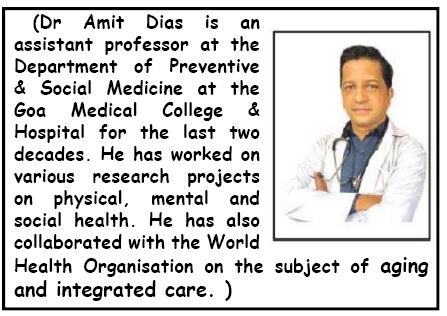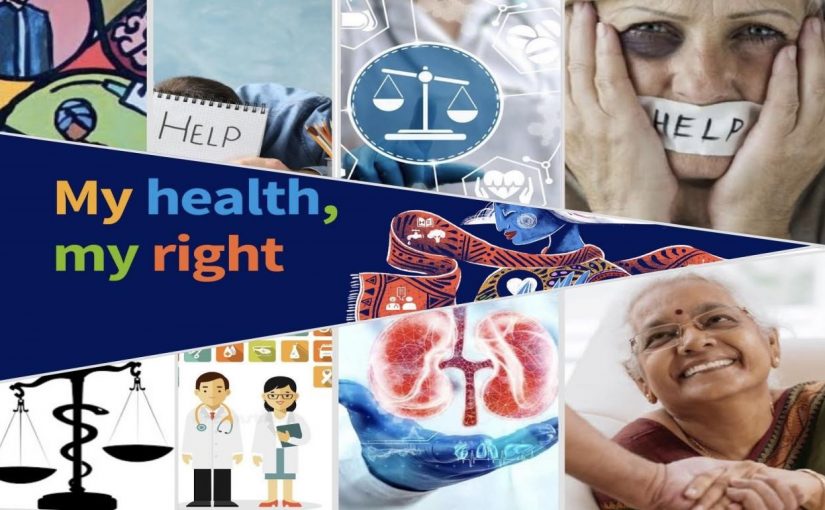An interview with Dr Amit Dias
A World Health Day Special!
On the occasion of World Health Day observed annually on April 7, we had the privilege of conversing with Dr Amit Dias. In this week’s enlightening discussion Dr Dias sheds light on the profound significance of World Health Day and the theme for this year: “Our Health, is Our Right.” He emphasizes the shared responsibility incumbent upon all stakeholders in healthcare. Read on….
Goan Observer: Can you tell us the significance of observing World Health Day on April 7? What is the theme this year?
Dr Amit Dias: World Health Day is observed on April 7 to mark the anniversary of the founding of the World Health Organization (WHO) in 1948. It serves as an opportunity to raise awareness about global health issues and mobilize action to address them. The theme for World Health Day 2024 is “My Health, My Right.” This emphasizes the shared responsibility incumbent upon all stakeholders in healthcare to recognize and uphold this fundamental right.
Q: Could you explain how health became a right? What are the health rights of the people?
A: Health as a right is enshrined in the World Health Organization’s constitution. This means that every individual has the right to the highest attainable standard of physical, social, and mental health, without discrimination of any kind. Health rights include access to healthcare services, essential medicines, clean water, sanitation and nutritious food among other things.
We have come a long way in ensuring universal health coverage for the people, however, we still have to reach out to the vulnerable. For example, some seniors need help, people who are bed-bound and cannot get to the health care facility in time even if it is free of cost. One needs to think of various task-shifting methods, including the use of technology, to help bridge the gap.
Recognizing health as a right places a moral and ethical obligation on governments and societies to guarantee equitable access to healthcare for all individuals, irrespective of their socio-economic status.
Q: What are some of the major public health challenges in the world today?
A: The world today is faced with several health problems and needs several interventions at various levels to provide health for all. Here is a summary of some of the important problems we are grappling with.
Non-Communicable Diseases (NCDs): NCDs such as cardiovascular diseases, cancer, diabetes, and chronic respiratory diseases are leading causes of morbidity and mortality worldwide. According to WHO, NCDs are responsible for an estimated 41 million deaths annually, equivalent to 71% of all deaths globally. These diseases disproportionately affect low- and middle-income countries, where 85% of premature deaths from NCDs occur.
Infectious Diseases: Despite significant progress in controlling infectious diseases, they remain a major public health concern. Diseases like HIV/AIDS, tuberculosis (TB), malaria, dengue, and neglected tropical diseases continue to pose significant threats to global health. For example, in 2020, there were an estimated 10 million new TB cases worldwide, with approximately 1.5 million deaths attributed to the disease.
Mental Health Disorders: Mental health disorders, including depression, anxiety, and substance use disorders, are increasingly recognized as significant contributors to the global burden of disease. According to WHO, depression is the leading cause of disability worldwide, affecting more than 264 million people globally.
Maternal and Child Health: Maternal and child health remain critical areas of concern, particularly in low-resource settings. Complications during pregnancy and childbirth, as well as preventable diseases among children, contribute to maternal and child mortality rates. Globally, approximately 810 women die every day from preventable causes related to pregnancy and childbirth, while around 5.2 million children under the age of five die annually, mostly from preventable and treatable conditions.
Health Inequalities: Disparities in health outcomes persist within and between countries, driven by factors such as socio-economic status, education, gender, ethnicity and geography. These inequalities contribute to differential access to healthcare services and worsen health outcomes for vulnerable populations. For example, according to WHO, women in low-income countries are 14 times more likely to die during childbirth than women in high-income countries.
Addressing these major public health problems requires a comprehensive approach that includes policy interventions, healthcare system strengthening, health promotion, education, research, and international collaboration. By prioritizing health as a fundamental human right and implementing strategies to tackle these challenges, we can work towards ensuring that everyone has the opportunity to attain the highest standard of health.
Q: What is being done to ensure that there is health for all, and how can primary healthcare help in achieving this goal?
A: To ensure health for all countries and organizations around the world are implementing various strategies, with a focus on primary healthcare. Primary healthcare plays a crucial role in providing essential health services, promoting health education, preventing diseases, and addressing the healthcare needs of communities, especially in underserved areas.
Q: Are there any specific strategies adopted in India to provide health for all?
A: Yes, indeed. India has implemented several initiatives to improve healthcare access and outcomes, such as the National Health Mission (NHM), Ayushman Bharat, and various public health programs targeting specific diseases like tuberculosis, malaria, and HIV/AIDS. We need to make sure that health interventions are Appropriate, Available, Affordable, Accessible, and Adequate- the five A’s of the right to health.
Q: Could you elaborate further on the five A’s for health care?
A: The five A’s are essential for ensuring that healthcare services meet the requirements of the right to health:
Appropriate: Healthcare services must be scientifically and medically appropriate, and tailored to meet the needs of individuals and communities.
Available: Essential healthcare services, including medicines and facilities, should be available in sufficient quantity and within reasonable reach.
Affordable: Healthcare should be affordable for all, without causing financial hardship or exclusion from essential services.
Accessible: Healthcare services should be physically and economically accessible to everyone, without discrimination or barriers.
Adequate: Healthcare services should be of sufficient quality to be effective in improving health outcomes and meeting healthcare needs.
Q: The problem people have with government health care is quality! How can we ensure quality in healthcare?
A: The government is taking several measures to prioritize the quality of health care and services provided through every level of care. Quality in healthcare can be ensured through various measures, including accreditation of healthcare facilities, continuous quality improvement initiatives, adherence to clinical guidelines, and patient feedback mechanisms. NQAS, or National Quality Assurance Standards, are standards set by the government or relevant authorities to assess and ensure the quality of healthcare services provided in a country or region. The various health programs have built quality checks and monitoring systems using technology to ensure accountability and outcome delivery. There has been a great improvement in the delivery of health care and its quality.
Q: Thank-you for your valuable insights and what is your final message to the people?
A: Health as a right implies that every individual has an inherent entitlement to the highest attainable standard of physical and mental health, as recognized in international human rights instruments such as the Universal Declaration of Human Rights and the International Covenant on Economic, Social, and Cultural Rights. Health is not merely a commodity or a privilege but a fundamental aspect of human dignity and well-being. By recognizing health as a right, we acknowledge that it is the responsibility of governments, healthcare providers, and society as a whole to create the conditions necessary for everyone to enjoy their right to health. It starts with everyone understanding that basic health care is their right.

